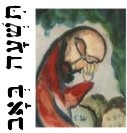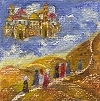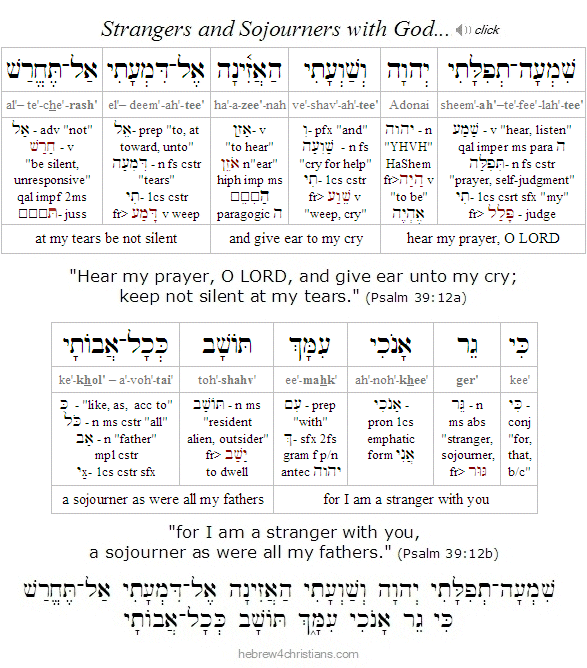|
Parashat Behar includes two special laws that were intended to radically affect the social, economic, and spiritual well-being of Jews in ancient Israel. The first law was to "release the land" every seventh year, called ha-shemittah (הַשְּׁמִטָּה), which meant that the land would lie fallow by not being seeded or harvested (see Lev. 25:1-6). The shemittah law involved far more than simply refraining from agricultural labor, however, since it implied that everyone was required to forgive all their debtors as well (Deut. 15:1-4). This recurring cycle of "rest and forgiveness" was to be commemorated as an appointed time (מוֹעֵד) when everyone would gather together during the festival of Sukkot to listen to the Torah read aloud (Deut. 31:10-12). God's word was proclaimed from Zion; the land would breath and rest; people's burdens were lifted; and everyone would dwell in booths (sukkot) to recall their temporary status on the way to obtaining an eternal inheritance... No wonder Sukkot was regarded as the most joyous of the Torah's holidays!
The second special law was even more joyous. After seven of these seven-year sabbatical cycles (shemittot) had elapsed, the 50th year (called the "Jubilee" year [i.e., shenat ha-Yovel: שְׁנַת הַיּוֹבֵל]) was proclaimed, and all servants would be set free (i.e., "released"), all debts would be forgiven, and the land would be "reset" to its original condition (Lev. 25:8-17). This joyful occasion is called the "Jubilee Release" and signifies the life of redemption (גְּאֻלָּה) for the community of God. It is also called Shemittah LaAdonai: "the LORD's Release" (Deut. 15:2). Just as Shavuot comes after seven cycles of seven days (i.e., the 50th day of Sefirat HaOmer) and therefore represents the perfection of freedom, so the Jubilee Year (Yovel) signals a time of freedom, dignity and equality for all people.
On Yom Kippur of the Year of Jubilee, a great shofar blast (i.e., teruah: תְּרוּעָה) would be sounded throughout all the land to proclaim liberty: "You shall sound the shofar on the tenth day of the seventh month, on the Day of Atonement (וֹם הַכִּפֻּרִים) shall you sound the shofar throughout all your land. And you shall hallow the fiftieth year, and proclaim liberty (דְּרוֹר) throughout all the land to all its inhabitants thereof: it shall be a Jubilee (יוֹבֵל) for you. And you shall return every man to his estate, and you shall return every man to his family" (Lev. 25:8-10). Despite the fact that part of this verse appears on the "Liberty Bell" in Philadelphia, this verse ultimately refers to the coronation of the Mashiach Yeshua as the true liberator of the Jewish people.... Indeed, the word yovel is another word for a ram's horn, or shofar, signifying the coronation of the King...
The observance of shemittah (שְׁמִטָּה) was a real test of faith, since it meant that the Jews had to completely trust that the LORD would provide for them, despite abandoning their usual farming and banking practices. God repeatedly warned the Jews not to oppress one another (Lev. 25:14,17) and explicitly promised His protection and care despite these counterintuitive practices (Lev. 25:18-22). Sadly, the people did not observe the laws of shemittah, and this eventually lead to the 70 year captivity in Babylon, one year in captivity for each year that shemittah was disregarded (2 Chron. 36:20-21).

Regarding the laws of Shemittah and Yovel, the LORD states: "The land shall not be sold in perpetuity, for the land is mine, for you are strangers (גֵּרִים) and settlers (תּוֹשָׁבִים) with me" (Lev. 25:23). This is a paradoxical phrase, since a ger is one who is just passing through, like a visitor or tourist, whereas a toshav is one who is a resident, like a settler or citizen. How can someone be both a visitor and a resident of a place, or a stranger and a citizen at the same time? How can one "pass through" a place he is said to dwell?
Concerning this paradox the Maggid of Dubna comments: "If you see yourselves in this world as strangers and remember that you are here only for a short visit, passing through the hallway of this world, then I will settle among you. However, should you see yourselves as settlers on this world, "owners" who are here to stay, then I am but a stranger among you. Either you are the settlers and I the stranger, or you the stranger and I the settler."
Torah describes the people of faith as "gerim ve'toshavim imadi" (גֵרִים וְתוֹשָׁבִים עִמָּדִי), "stranger-settlers" with God in this world (Lev. 25:23). We are "in" but not "of" this realm; we live in the temporal yet are looking for the heavenly city to come (Heb. 11-9-10). Indeed the Eternal dwells among those who are exiles in this world, but to those who lay claim to life in this world God makes himself a stranger. .. As James warned, "Do you not know that friendship with the world is enmity with God? Therefore whoever wishes to be a friend of the world makes himself an enemy of God" (James 4:4). Likewise the Apostle John admonished: "Do not love the world or the things in the world. If anyone loves the world, the love of the Father is not in him... For the world is passing away along with its lusts, but whoever does the will of God shall abide forever" (1 John 2:15,17). Those who walk in faith invariably find themselves gerim v'toshavim (גֵּרִים וְתוֹשָׁבִים) - "strange settlers" upon the earth (Heb. 11:13).

Abraham "sojourned" in the land of promise, as in a foreign land, living in tents with his children because he looked for a city whose builder and maker was God (Heb. 11:9-11). Likewise we are strangers and exiles here, on the journey to the reach "the City of Living God, to heavenly Jerusalem, to the assembly of the firstborn who are enrolled in heaven" (Heb. 12:22-23). When we take up the cross and follow Yeshua, we die to this world and its dreams. We die to ourselves in order to find life (Mark 8:35-36). We give up houses, lands, all our possessions, family relationships, and even our own lives in order to find residence with God (Matt. 19:29; Luke 14:26). We reckon ourselves "dead" to this world as our home and "look not to the things that are seen but to the things that are unseen; for the things that are seen are transient, but the things that are unseen are eternal" (2 Cor. 4:18). We walk by faith, not by sight. Faith is the conviction (ἔλεγχος) of things unseen (Heb. 11:1) - and that includes the conviction that God will visibly care for our needs even if we let our gardens go fallow and release our claim on all our debtors...
We must venture out to take hold of the miraculous Presence of God. "According to your faith be it done unto you" (Matt. 9:29). I pray that we do not miss this awesome opportunity to truly share the present exile with God, chaverim, for one day those who are "strangers" with Him shall share His glory.... Meanwhile, we are not without comfort, though we still groan for the great homecoming to come.
Hebrew Lesson
Psalm 39:12 reading (click for audio):
When we are strangers to this world, we reside with God: we are called residents of heaven. To be a stranger to this world is a great blessing, since it means we identify our home in the heart of God. By extension, reality is measured by proximity to the Eternal, and the material world - when regarded as an end in itself - is nothing but an illusion, since it cannot exist apart from the sustaining power of God (Heb. 1:3; Col. 1:16-17; Rev. 4:11). The sages note that in Hebrew there is no language of categorical ownership, since all things are conditioned by time. We say yesh li (יש לי) - "there is to me" (for this time) rather than "I have" or own. Ownership is related to the "bone" (עצם) of something, its inner structure and essence. God alone is koneh shamayim va'aretz (קנה שׁמים וארץ), the Owner of Reality (Gen. 14:19). "For from him and through him and to him are all things. To him be glory forever. Amen" (Rom. 11:36).
|





